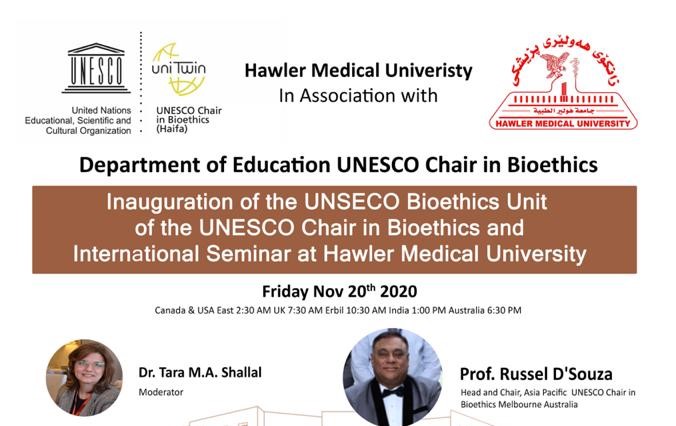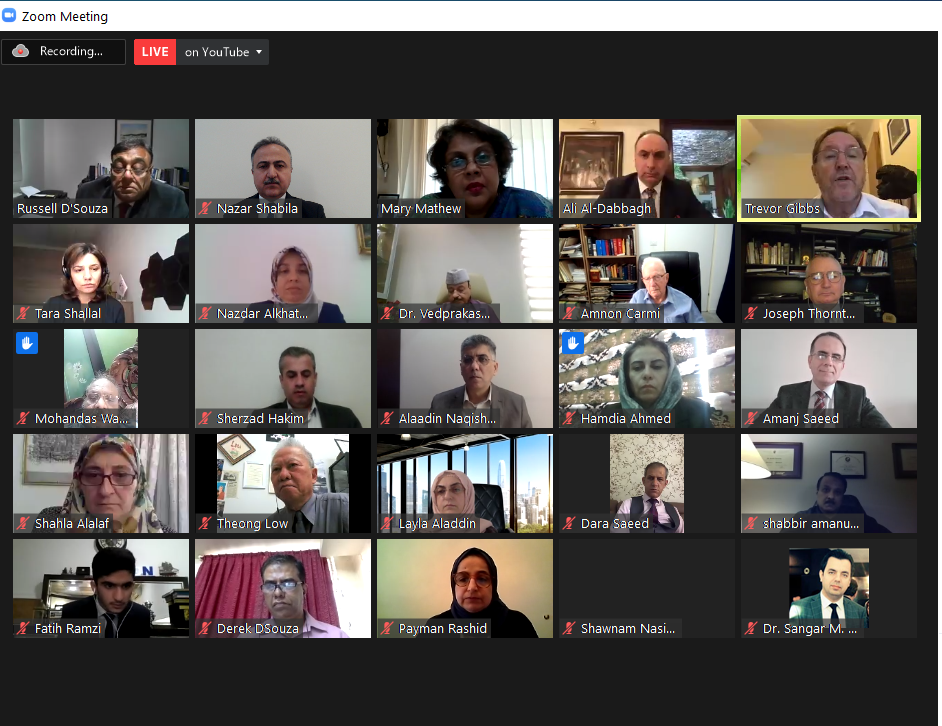The official inauguration of the Bioethics Unit at Hawler Medical University under the UNESCO Chair was conducted in a virtual ceremony on 20 November 2020.
The establishment of the Bioethics Unit at Hawler Medical University is the outcome of a collaboration with the UNESCO Chair in Bioethics and the Asia Pacific Bioethics Network UNESCO Chair.
The inauguration ceremony was accompanied by an international webinar on bioethics. Speeches were delivered by the Dr. Amanj Saeed, representative of the Ministry of Higher Education and Scientific Research, Professor Ali Dabbagh, dean of the College of Medicine and head of the Bioethics Unit, Professor Russell D’Souza, Chair Asia Pacific Program of UNESCO Chair of Bioethics. The international webinar addressed the topic of “Why faculty development is important in medical education by Professor Trevor Gibbs, while the discussion panel addressed the topic of Corona vaccine trials: Ethical dilemmas considered” moderate by Prof. Russel D’Souza.
The ceremony and the webinar was attended by more than 200 participants from Hawler Medical University and other university from different countries.
The Bioethics Unit at Hawler Medical University aims to introduce bioethics in medical, dental, pharmacy, and nursing curriculum and conduct research in Bioethics in the Iraqi Kurdistan context.
Vision of Bioethics Unit
To be an institution that is in tune with the UNESCO’s standards in creating and developing innovative fields and units relevant to Hawler Medical University’s academic programs needs and requirements.
Our Mission of Bioethics Unit
The creation of the Bioethics unit is in accordance with Hawler Medical University’s vision above. This is also a requirement due to the current global crisis with COVID-19 and the public health issues related to it. The proposed unit seeks to:
-Implement a curriculum that is inclusive of all programs and disciplines at the Hawler Medical University.
-Establish a platform for exchanging and sharing experiences related to ethical and moral issues that correlate with bioethics, research ethics and medical ethics in all biomedical sciences.
-Build a collaboratively based research front for academics to benefit from each other and seek others’ opinions on a global level in all fields related.
Values of Bioethics Unit
Equal opportunities, no discrimination, professionalism, clinical competence, and lifelong learning.
Proposed activity framework of the unit
Encourage conceptual changes in medical faculties
Develop a modern curriculum for education of ethics
Educate the potential teachers for instruction of ethics
Devise new tools and materials of ethics
Conducing short courses on bioethics for the teaching staff and students.
Integration of bioethics in the current curriculum of the colleges of medicine, dentistry, pharmacy, nursing and health sciences.
Considering future postgraduate study opportunities in bioethics field.
Conducting training courses and workshops to health care professionals of the ministry of health institutions.
Conducting research in the field of bioethics.
Work on advocating and advising the policy makers and health managers in bioethics issues, projects, and legislations.




